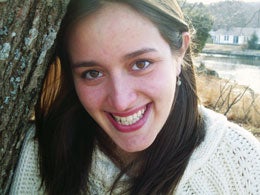Jessie Dyer ’09
 The Science of Soil
The Science of Soil
Jessie Dyer arrived at URI with an intense interest in soil. It’s a topic that led her to an internship in Hawaii, a research project in Costa Rica, and a gathering of environmental scholars in Arizona.
It was largely due to her understanding of soil science that she was recognized at Commencement with the President’s Award for Student Excellence in Environmental Science.
A resident of Narragansett, Dyer began to learn about soil science through a high school Envirothon. “There are all sorts of morphological parameters to soil like texture, structure, and color, which tells you everything you need to know,” she said. “The color of soil tells you about its mineralogy, its structure, its wetness class, and the amount of organic matter it contains.”
Profile Focus: URI’s Newest Alums
As part of the University’s soil judging team, she competed against soil science students from other universities and helped URI place second at the regional competition and seventh at the nationals in 2009. In a soil judging competition, students climb into a pit six-feet deep to collect soil samples for characterization and analysis.
In 2008, Dyer was awarded a Udall Scholarship, the most prestigious national scholarship for environmental science, and was invited with other winners to a conference in Arizona that she described as “a pretty inspirational experience.”
Last summer she worked for the Natural Resources Conservation Service, a division of the U.S. Department of Agriculture, in Kauai, Hawaii, as a conservation planner, conducting wildlife habitat restoration projects and working with farmers.
As a sophomore she participatedin a three-week research project in Costa Rica assessing the diversity of mammals in shade-grown coffee plantations compared to those found in traditional coffee plantations.
“We learned about working as a team, living in challenging conditions, and how to construct an experiment,” Dyer explained. “In the end, though, I left the wildlife scene and returned to soils. I didn’t like the biting and urination and bleeding that goes along with mammal research.”
—Todd McLeish
 Home
Home Browse
Browse Close
Close Events
Events Maps
Maps Email
Email Brightspace
Brightspace eCampus
eCampus


